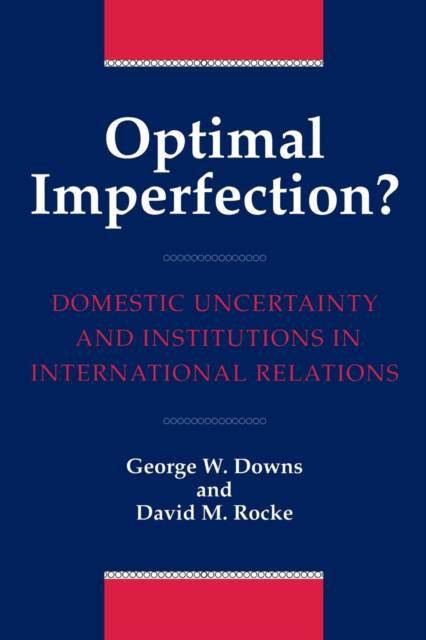
- Retrait gratuit dans votre magasin Club
- 7.000.000 titres dans notre catalogue
- Payer en toute sécurité
- Toujours un magasin près de chez vous
- Retrait gratuit dans votre magasin Club
- 7.000.0000 titres dans notre catalogue
- Payer en toute sécurité
- Toujours un magasin près de chez vous
Optimal Imperfection?
Domestic Uncertainty and Institutions in International Relations
George W Downs, David M Rocke
88,95 €
+ 177 points
Description
"Domestic politics matters" has become a rallying cry for international relations scholars over the past decade, yet the question still remains: Just how does it matter? In this book, George Downs and David Rocke argue that an important part of the international impact of domestic politics springs from the institutional responses to its many uncertainties. This impact is due not so much to the errors in judgment these uncertainties can cause as to the strategic and institutional consequences of knowing that such errors are possible.
The heart of the book is its formal analysis of how three kinds of domestic uncertainty have shaped international relations through their influence on three very different institutions. One chapter deals with the decision rules that citizens create to cope with uncertainty about the quality of their representation, and how these can lead to the paradoxical "gambling for resurrection" effect. Another chapter describes the extent to which the weak enforcement provisions of GATT can be understood as a mechanism to cope with uncertain but intermittent interest group demands for protection. The third chapter looks at the impact of uncertainty on the creation, survival, and membership of multilateral regulatory institutions, such as the Montreal Protocol and EU, when some states question the capacity of other states to meet their treaty obligations.Spécifications
Parties prenantes
- Auteur(s) :
- Editeur:
Contenu
- Nombre de pages :
- 176
- Langue:
- Anglais
- Collection :
Caractéristiques
- EAN:
- 9780691016252
- Date de parution :
- 06-03-97
- Format:
- Livre broché
- Format numérique:
- Trade paperback (VS)
- Dimensions :
- 157 mm x 234 mm
- Poids :
- 285 g

Les avis
Nous publions uniquement les avis qui respectent les conditions requises. Consultez nos conditions pour les avis.






